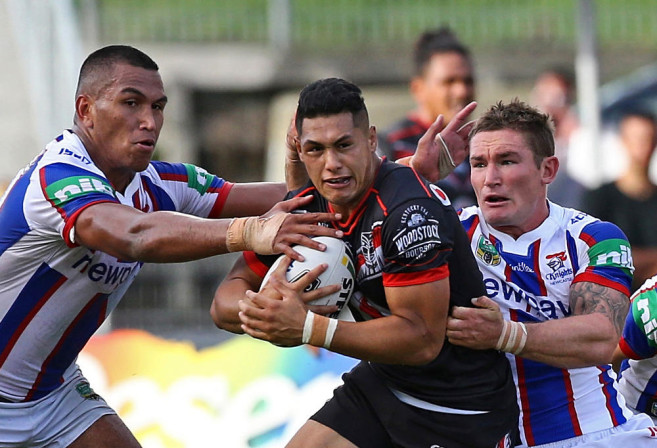I’m going to write ten statements that no Queenslander, no internationalist, and not many journalists would usually wish to commit to record.
Josh Dugan is a great footballer. Andrew Fifita is too. Blake Ferguson really played a top game last night.
Russell Packer could become one of the best things to happen to trans-Tasman football. Conversely, Shaun Johnson may not.
Okay that’s five contrarian points.
The World Cup will be better if Kieran Foran participates, no matter which clubs he has torched. For all the Kiwis’ attacking prowess, we really need to focus on their defensive deficiencies.
Australia has a record in rugby league that truly deserves to be applauded.
Right, that’s six, seven and eight.
Hmm…how about questioning if Roger Tuivasa-Sheck – yep the guy with the majestic highlight reels – really is what New Zealand needs at fullback?

And for a final statement, let’s just all agree that weight-for-age football is total tosh and should never be splashed across the pages of a newspaper again.
As I nestled into the couch for last night’s Test, the occasion was supposed to be all about the virtuous.
It was Cameron Smith’s 50th game for Australia, a coronation of an ambassador. The match was also going to highlight just how strong the New Zealand team was, and ergo, how far international rugby league had come.
These were the narratives that played to the heart and mind of a proud Maroon, an avowed expansionist, and a writer who loves to get deeply moralistic at times.
Except, well, it all amounted to bulldust.
Last night’s 30-12 win by Australia was not about the virtuous at all. It was about being able to accept villainy and imperfection.
Those of us commentators standing on our pulpits, tut-tutting these last few years at the exploits of Fifita, Dugan, Ferguson, Packer and Foran, got served a massive dish of humble pie.

The quintet took the field, they did stuff most of us would never physically be capable of, they got paid handsomely for it, and they’ll no doubt be invited back to do it again.
On a day when Shaun Kenny-Dowall became the NRL’s latest leper, moral gatekeepers would have been hoping karma caused some of the more troublesome players to underperform
Some self-appointed judges would not have allowed them to take the field in the first place. That’s what our modern day sense of justice has become.
The much more palatable storyline would have been the Kiwis with the flashy feet and trendy haircuts – Johnson, Tuivasa-Sheck, Jordan Rapana, Dallin Watene-Zelezniak, Marty Taupau – ushering in league’s new world order.
Or it would have been Smith providing the steady head to keep Australian necks just above water in a torrid contest.
Instead we got the bad boy trio of Fifita, Dugan and Ferguson rumbling through the centre of a Kiwis team that clean forgot how to tackle.
For the benefit of any New South Welshmen with an axe to grind, I’ll throw Sam Thaiday in there as another villain who caused the sheep-lovers some damage.
By halftime New Zealand’s missed tackle rate was just under 12 per cent. That is, they failed at approximately one in every eight or nine tackles.
At any level of football, the thing that gives an attacking side most confidence is when they know their next tackle bust is just around the corner.
Australia’s missed tackle rate in the opening stanza was almost exactly half of the Kiwis, despite being forced to carry more of the load.
But this type of analysis rarely encourages clicks or causes excitement, so expect more media focus before the World Cup on Johnson’s jinking runs and RTS leaving defenders clutching at thin air.
If moral justice and society’s desire had anything to do with performance, the clean-cut Kiwi #7 and #1 would have dominated last night.
The truth however was that Johnson failed to execute with precision, particularly in regards to his kicking and providing his outside men good ball.
Tuivasa-Sheck not only fumbled three retrievals, his support play was unremarkable, and his efforts in last-ditch defence were paltry compared to some of the Aussie’s desperate scrambles.
It was left to Foran and Packer – two guys about whom there are grave questions regarding whether they should even be participating in the sport – to provide the spark the Kiwis needed.
Foran played directly, authoritatively and cleverly. Packer butted heads (quite literally in the case of Dugan) with the Aussies in a way that makes one yearn for a long-standing rivalry with the likes of David Klemmer.
For those of us looking for the contest to provide a positive commentary about the shifting sands of international football and the virtues of an underdog, you had to take a long-term perspective.
That is to think, centuries from now when humans are hopefully playing the same sport in a similar fashion – and players don’t have to leave the field to assess chipped fingernails – historians really will marvel at how Australia maintained its dominance.
How a population of 24 million people without an obvious genetic disposition for power sports kept such a vice grip on the code for so many decades will hopefully be retold like the Battle of Thermopylae.
As much as I want to see other countries catch up, credit is due where credit is due.
Which kindly ties into the last contrarian statement I wanted to make, which will no doubt see me turfed out of the Press Club and the worry-wart columnists brigade.
Wasn’t Australia (or more honestly caucasian Australia) supposed to have been over-run by the numbers of Pacific Islanders playing junior grades for the past ten years?
Last night Australia not only comfortably won the men’s Test, but also beat New Zealand well in the women’s and junior fixtures.
Matt Gillett, by no means the biggest forward around, was the player of the match in the main game, while a number of smaller players who presumably grew up tackling bigger ones also fared well.
Maybe that’s because a necessary ingredient in the sport is having a bit of mongrel.
And political correctness and morals are best left to those who watch from the sideline.































































































